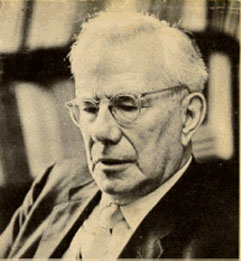 |
| Paul Tillich |
Existential
Pioneers
21. Paul
Tillich
(1886–1965)
Existential theologian of the ‘God above God’
Anthony Stadlen
conducts Inner Circle Seminar No. 218
Sunday 25 October 2015
10 a.m. to 5 p.m.
(1886–1965)
Existential theologian of the ‘God above God’
Anthony Stadlen
conducts Inner Circle Seminar No. 218
10 a.m. to 5 p.m.
Paul Tillich (20 August 1886 – 22 October 1965 ) was a leading
twentieth-century existential Christian theologian. In Systematic Theology (1951, 1957, 1963) he wrote: ‘God does not
exist. He is being-itself beyond essence and existence. Therefore to argue that
God exists is to deny him.’ He insists that God is the ‘God above God’: not a
god called ‘God’, not a being among beings.
Tillich found what he called ‘God’ in non-Christian
religions and in ‘secular’ art, in ways often lacking in ‘Christianity’. As a German, he courageously opposed the Nazis’
persecution of the Jews, and had himself to escape to the United States
Tillich’s son, who later himself became a psychotherapist,
questioned his theologian father’s hypocrisy over his sexual affairs, but
Tillich said he had never spoken on adultery. And Tillich’s student, the
existential analyst Rollo May, said Tillich ‘did enjoy good pornography’. May
called The Courage to Be ‘the most existential book written in America
Do Tillich’s extraordinary writings make sense even to ‘atheist’
thinkers, and to ‘atheist’ psychotherapists in particular? Is the ‘God’ he does
not believe in the ‘God’ they do not believe in? However they respectively
conceive of the object of their disbelief, can or does Tillich’s ‘God above God’,
‘being-itself’, have any resonance or significance for ‘atheist’
psychotherapists, or do they dismiss it as an evasive verbal formula? The answer to this must surely have implications for their
work with ‘religious’ clients, and for the work of ‘religious’ therapists with ‘atheist’
clients.
You are warmly invited to help evaluate the work of this complex
and controversial, radical existential thinker, and especially its
implications for psychotherapy.
Venue: ‘Oakleigh’, 2A Alexandra Avenue , London N22 7XE
Cost:
Psychotherapy trainees £120, others £150, some bursaries; coffee, tea, biscuits, mineral water included;
payable in advance; no refunds or transfers unless seminar cancelled
Apply to: Anthony
Stadlen, ‘Oakleigh’, 2A Alexandra
Avenue , London N22 7XE
Tel: +44 (0) 20 8888
6857 E-mail: stadlen@aol.com
For
further information on seminars, visit: http://anthonystadlen.blogspot.com/
No comments:
Post a Comment